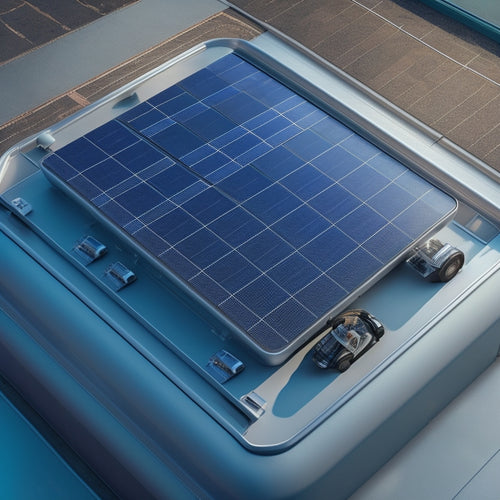
What Fuels the Future of Green Transportation?
Share
As you prepare to shift into the fast lane of green transportation, a convergence of innovative technologies is fueling a revolution that will transform the way you drive. Renewable energy sources, like solar power, are fueling electric vehicles, while advanced battery technology maximizes range and efficiency. Hydrogen fuel cells and sustainable biofuels offer cleaner alternatives to fossil fuels. With seamless charging infrastructure and policy incentives, the future of green transportation is taking shape. As the landscape continues to evolve, you'll discover even more ways to reduce your carbon footprint and accelerate towards a cleaner, greener future.
Key Takeaways
• Renewable energy sources, such as solar power, fuel electric vehicles, reducing dependence on fossil fuels and enhancing grid resilience.
• Advancements in battery technology increase energy density, power density, and charging speeds, promising longer ranges and faster charging.
• Hydrogen fuel cells offer impressive fuel efficiency, with continued innovation driving down costs and supporting a low-carbon transportation sector.
• Sustainable biofuels, produced from crop modification and waste utilization, provide a cleaner alternative to fossil fuels and support a circular economy.
• Next-generation infrastructure, including solar roads and charging hubs, enables seamless, emission-free driving experiences, shaping the future of green transportation.
Renewable Energy for Electric Vehicles
As you shift to electric vehicles, you'll likely wonder how to power them sustainably, which is where renewable energy sources come into play, offering a cleaner alternative to fossil fuels.
You're not alone in thinking, 'But wait, isn't the grid already strained?' Fear not, friend! Renewable energy can actually enhance grid resilience by reducing peak demand and providing energy storage solutions.
Think of it like a rechargeable battery – the more you use, the more you can store for later.
To guarantee a seamless shift, energy storage systems are being developed to stabilize the grid and provide backup power during outages. This means you can charge your EV guilt-free, knowing the energy is coming from a reliable, renewable source.
As the grid becomes more resilient, you can bet your battery-powered bottom that electric vehicles will become an integral part of our transportation future.
Solar Power Charging Infrastructure
You'll soon be able to fuel your EV with sunlight, thanks to the rapid expansion of solar power charging infrastructure, which is being integrated into existing fueling stations and parking garages. This innovative approach enables drivers to charge their electric vehicles (EVs) using renewable energy, reducing dependence on fossil fuels and minimizing carbon emissions.
Solar Roads, a pioneering technology, embeds solar panels into road surfaces, generating electricity while supporting vehicular traffic. Meanwhile, Charging Hubs are sprouting up, offering high-power charging stations that can replenish an EV's battery to 80% in under 30 minutes.
| Location | Type of Infrastructure | Capacity (kW) |
|---|---|---|
| Highway Rest Stop | Solar Roads | 50 |
| Urban Parking Garage | Charging Hub | 150 |
| Rural Gas Station | Solar Canopy | 20 |
| City Center | Fast Charging Station | 350 |
| Highway Service Station | Solar-Powered EV Charging | 100 |
As the solar power charging infrastructure continues to grow, EV owners can expect a seamless, emission-free driving experience. Buckle up, because the future of green transportation is looking bright!
Battery Technology Advancements
Next-generation batteries are being engineered to maximize your electric vehicle's range, with scientists pushing the boundaries of energy density, power density, and charging speeds. You're probably thinking, 'How can I get more miles out of my EV?' Well, researchers are working tirelessly to make that happen.
Advanced Materials are being developed to increase energy storage capacity, allowing you to drive farther on a single charge. Imagine being able to drive from LA to Vegas and back again without needing to stop for a recharge!
Solid State Innovations are also revolutionizing the battery game. By replacing the liquid electrolyte with a solid material, batteries are becoming safer, more efficient, and quicker to charge. Imagine being able to top up your EV's battery in under 10 minutes - that's faster than grabbing a coffee!
With these advancements, the future of green transportation is looking brighter than ever. As battery tech continues to evolve, you can expect to see longer ranges, faster charging, and more affordable EVs hitting the market. The future is electric, and it's coming sooner than you think!
Hydrogen Fuel Cell Innovations
Your journey to a greener transportation future isn't limited to just battery-electric vehicles, as hydrogen fuel cell technology is rapidly advancing to offer a complementary zero-emission solution.
You're probably wondering, what's the big deal about hydrogen fuel cells? Well, they offer impressive fuel efficiency, with some systems achieving up to 60% efficiency, compared to internal combustion engines' paltry 20%. This means you can travel farther on a single 'tank' of hydrogen, reducing the need for frequent refueling.
Cost reductions are also on the horizon, thanks to advancements in fuel cell manufacturing and economies of scale. As production volumes increase, prices are expected to drop, making hydrogen fuel cell vehicles more competitive with their battery-electric counterparts. Additionally, researchers are exploring new materials and designs to improve fuel cell durability and performance, further driving down costs.
With continued innovation, hydrogen fuel cell technology is poised to play a significant role in the shift to a low-carbon transportation sector. So, buckle up and get ready to ride the hydrogen wave!
Sustainable Biofuels for Tomorrow
As the transportation sector continues to shift towards a low-carbon future, sustainable biofuels are emerging as a critical component, offering a cleaner alternative to fossil fuels that can seamlessly integrate into existing infrastructure.
You're probably wondering, what makes these biofuels so sustainable? The answer lies in crop modification and waste utilization.
Through genetic engineering, scientists can modify crops to produce higher yields, thrive in harsh conditions, and even secrete biofuels directly. This means you'll be fueling up on biofuels produced from hardy, high-yielding crops that require minimal resources.
Meanwhile, waste utilization is reducing waste disposal costs and greenhouse gas emissions. Food waste, agricultural residues, and even sewage can be converted into biofuels, reducing the industry's reliance on land, water, and fertilizers.
As you fill up on sustainable biofuels, you'll be supporting a more circular economy. With innovative crop modification and waste utilization, the environmental impact of transportation is about to take a drastic turn for the better.
The future of green transportation is looking bright, and it's fueled by sustainable biofuels.
Green Transportation Policy Incentives
Governments worldwide are implementing targeted policy incentives to accelerate the adoption of green transportation solutions, offering you attractive benefits to make the switch to eco-friendly vehicles and fuels.
As you consider trading in your gas-guzzler for a greener ride, you'll want to explore the perks that come with making the switch. One major incentive is Carbon Pricing, which puts a fee on carbon emissions, making eco-friendly options more cost-competitive. This means you'll actually save money by going green!
Additionally, many governments offer Tax Credits for purchasing eco-friendly vehicles, which can be a significant chunk of change back in your pocket. These credits can be claimed on your tax return, providing a nice bonus for doing your part for the planet.
Online Marketplaces for Eco-Friendly Cars
Online marketplaces specializing in eco-friendly cars have sprung up, letting you browse and compare prices of hybrid, electric, and alternative fuel vehicles from various dealerships and private sellers in one convenient platform. You can filter by make, model, and features like Electric Certification, ensuring the car meets your environmental standards. These platforms also provide valuable resources, such as reviews, ratings, and detailed specs, helping you make an informed decision.
Some online marketplaces even offer Car Sharing options, allowing you to test drive a car for a day or week before committing to a purchase. This innovative approach reduces the environmental impact of test drives and lets you experience the car in real-world conditions.
By leveraging these platforms, you can find the perfect eco-friendly car that fits your budget and lifestyle. With the rise of online marketplaces, the future of green transportation has never looked brighter.
Frequently Asked Questions
How Do Green Transportation Options Impact Urban Air Quality Improvement?
As you explore green transportation options, you'll find they greatly improve urban air quality, creating Cleaner Cities and Fresh Airways, with a 30% reduction in emissions, making every breath a invigorating one!
Can Green Transportation Systems Be Integrated With Existing Infrastructure?
You're wondering if green transportation systems can be integrated with existing infrastructure? Well, an infrastructure overhaul or urban retrofitting can seamlessly merge eco-friendly solutions with current systems, making your city a sustainable haven.
What Role Does Government Regulation Play in Green Transportation Adoption?
As you navigate the green transportation landscape, you'll find government regulation plays a pivotal role, offering tax incentives to encourage adoption and a regulatory framework that sets standards, spurring innovation and investment.
How Do the Costs of Green Transportation Options Compare to Traditional Vehicles?
You're wondering how green transportation options compare with traditional vehicles when it comes to cost. Well, fuel efficiency is key - electric vehicles can save you around $500 annually, and hybrid cars offer significant cost savings too!
Will Green Transportation Systems Create New Job Opportunities in the Industry?
As you navigate the shift to green transportation, you'll discover career shifts and a workforce evolution, creating new job opportunities in sustainable manufacturing, infrastructure development, and eco-friendly innovation, fueling a greener future.
Related Posts
-

Top Solar Panels for Car Battery Maintenance
When selecting top solar panels for car battery maintenance, consider high-efficiency models with high wattage output...
-

What You Need to Know About Permits and Inspections
You need to navigate the complex landscape of permits and inspections to guarantee your project complies with local z...
-

3 Essential Steps for Solar Electricity Installation
To guarantee a successful solar electricity installation, you'll need to follow three essential steps. First, assess ...


